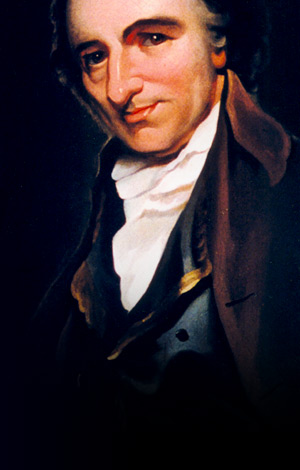Study Guide
UNIVERSAL HUMAN RIGHTS AND CONSCIENCE
“(We) don’t grant liberty of conscience as a favor, but confirm it as a right.”
Phillip Foner page 285. Excerpt from “A Serious Address to the People of Pennsylvania on the Present Situation of their Affairs” in Pennsylvania Packet, December 1, 5, 10, 12, 1778
“A government of our own is our natural right….(We must be) bringing forward a system of government in which the rights of all men should be preserved. ”
“We have the power to begin the world over again.”
“Each age and generation must be free to act for itself..as the ages and generations that preceded it.”
Common Sense, 1776
Commentary
Thomas Paine was a catalyst for establishing a Republic of Conscience in which the right of every citizen to participate in public policy formation was encouraged and the duty of every political representative to engage in periodic constitution-building was expected. Each generation must reform its own political culture and principled civil order—from the neighborhood to the nation—in terms of moral, social, and ecological sustainability.
Questions
- How does a person’s natural right of conscience lead to political principles such as separation of church and state and protection of individual rights?
- How might we rethink our real civic needs and obligations? Is it possible to give fresh meaning to the prophetic phrase “think globally, act locally”? Would a vibrant example of “thinking globally” in locus, be “Teach for All”, the global network of locally run teams of teachers who share best practices and recruit good young people in support of the aim of helping people in their countries to realize their potential?
- How would joint, local research and planning educate us to what makes our living place unique—its natural ecology and diverse human talents and resources? Could such democratic planning in neighborhoods as well as townships, municipalities, and state capitols increase awareness of the human multidimensionality of public planning—its moral, social, economic, and ecological valences? If so, could this lead to a “perceptual down-shift” from the ecologically deceptive notion of “unlimited economic growth” to the tempered embrace of “sufficiency economics”? Would “sufficiency economics” allow more leisure for cultural regeneration and enrichment, allowing a more multidimensional definition of “prosperity”?
- How can we educate our fellow citizens to express their conscience and engage in a conscientious constitution-building and civic ordering and adaptation from neighborhood to nation?


